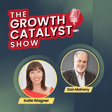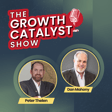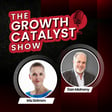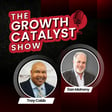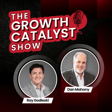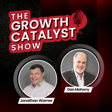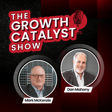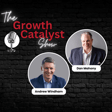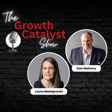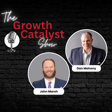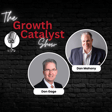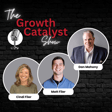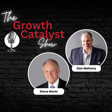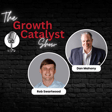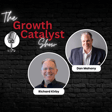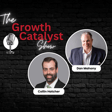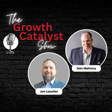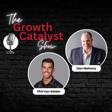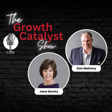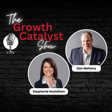Become a Creator today!Start creating today - Share your story with the world!
Start for free
00:00:00
00:00:01

Strategic Planning & Business Coaching with Cary Matthews
Cary Matthews, Managing Partner of Opal Partners Group, shares his business advising experience and stories of crafting inspiring visions and strategic plans for his clients. Cary shares his passion for helping small businesses address challenges, make strategic changes, and unleash their full potential.
Transcript
Show Introduction and Host Introduction
00:00:00
Speaker
Welcome to The Growth Catalyst Show where we believe that growth can come in many forms, professional, personal, company, sales, you name it. I'm your host, Dan Mahoney, founder of Transcendent Sales Solutions and a guide to a world of growth possibilities. I've spent my career empowering companies and their people with strategies that accelerate growth.
00:00:18
Speaker
I'm here to bring you stories of these business leaders and their trusted advisors to gain insights into their journeys and learn how they fueled their own growth. Just maybe their journey could become part of your own growth story. Are you ready? Let's grow.
00:00:34
Speaker
Welcome to the next episode of The Growth Catalyst Show. I'm your
Guest Introduction: Kerry Matthews
00:00:37
Speaker
host, Dan Mahoney. My next guest is Kerry Matthews, and he is the managing partner of Opal Partners Group, where he provides fractional COO services, business strategy coaching, and team development workshops. He helps his clients craft a vision and strategic plan that is actionable and inspiring. Kerry's experience with small business goes back over 20 years as an operational leader and business advisor. Kerry, welcome to The Growth Catalyst Show.
00:01:04
Speaker
Dan, it's great to be here. Glad to have you. So ah let's dig right in. Atlanta native, I know you're here now. Is this where you always were from? you Compared to a lot of people, yes. I've been here since 94, but I grew up in middle Georgia. Took a flight detour through Alabama and then for college and came back to to Georgia. Where in middle Georgia? Warner-Robbins.
00:01:28
Speaker
Warner Robins, okay, oh it's definitely gotten big down there. They you know they got a Bucky's close to there, which is probably, it's put, it's if Warner Robins is on the map now with Bucky's, right? Close to it. Oh yeah, mom and dad go there for lunch sometimes, so it's huge. I love going there and watching people the first time, the first timers going to know Bucky's, and they've got that stunned look on their face, like, oh, it's like, it's going to be okay. I know it's a big gas station. Yeah, what is this place?
Kerry's Early Career and Aspirations
00:01:56
Speaker
and So you found yourself to Auburn, I see, with engineering degree and then an MBA, War Eagle. War Eagle. So what was the plan out of school? I mean, starting out with, I don't know if you got your MBA right after getting your engineering, but what was the plan coming out of school? What did you think you were going to do?
00:02:16
Speaker
So I actually did get my MBA right afterwards, because I wanted that balance of business and technical knowledge. That was always my plan. And for whatever reason, I think possibly because my cousin, who's older than me, was in telecom. I thought, I want to be a VP to telecom company. And I ended ended up, my first job was out of grad school was with Bell South.
00:02:39
Speaker
Wow. And that industry's changed quite a bit. You think about how big telecom was 25, 30 years ago, right? Like Sprint and all those and the bellwars and everything, how much things have changed. Oh, I know it's all moved to, uh, to cellular and internet now. VoIP. Yep, absolutely. So talk about some of the experiences you had in your early career. What are the same things that you did, you know, early on?
00:03:06
Speaker
So my very first job was as a college student, real my first real job, and I was a software engineer for the Air Force. I wrote software that tested the attack radar of the F-111. And a lot of people were competing for machine time to test our ah programs.
00:03:27
Speaker
um so my One of my counterparts said I'll take night shift and he started working on individual tests and I worked on in the daytime compiling the test together and then doing the business side of it realized the mix of business and ah Technical was for me. So I did that for quite a while until I graduated Then came out and I ended up in sales of all places with Bell South technical sales and And after doing that for a couple of years, my biggest account was UPS. I was managing that for nine states and moved into sales operations. And that's where I really fell in love with the whole operations side of business. For an engineer, it's like, oh, we get to put things in order and think logically this is handmade for me.
00:04:13
Speaker
And that doesn't usually happen in sales, right? No. And it's a cool thing. I was in sales operations. So like, okay, the sales side that stretched me, I got to combine with this stuff that was naturally more gifted at. And it was, it was a lot of fun.
00:04:28
Speaker
You know, I've been in sales for 30 plus years and I remember early on there was no such thing as sales ops or sales enablement or, you know, there was like, Oh, we have a sales assistant who can help us maybe do a quote or, or, or for bigger companies, someone that can help us with ah RFP, but not a whole operation side. So that's really talks about how much the profession is involved.
00:04:52
Speaker
Oh yeah, if you go back to the day, um the telecom companies had so much data, so many accounts, um and to bring all that all that together. And they were some of the pioneers in using CRM. So I was pulling all that stuff together to help people manage their accounts and get the quotes and everything they needed. And I really do think companies like Salesforce have helped for companies create sales ops because it's so extensive. And and i and like you said, there's so much data.
00:05:22
Speaker
Oh yeah, if you can find so many insights and so many things that you just don't see unless you really look at the data analytically. And it's something that a salesperson doesn't have time to do. They need to be out selling. Let's let the ops people do that for you. Plus all salespeople are clapping and smiling that are listening to this, but we all know they don't use CRM systems. Usually the the good ones are the are the worst users of it. So I mean, it's just the way it is. Yeah, that's true.
00:05:51
Speaker
Oh, so you worked for a lot of companies and I know you had a really good specialization in small to mid-sized businesses and worked with a lot of
Passion for Small Businesses and Community Impact
00:06:00
Speaker
those. Tell me about what you learned you like when you were on the on the company side working with small to mid-sized businesses.
00:06:07
Speaker
Well, first of all, I learned that I loved small business. It was like a breath of fresh air going from a Fortune 50 or Fortune 100 company to a small business. And my first experience with that was with a dot com that went dot bomb, but that's all right. But I found out that being present really matters, that you can pivot quickly, that you can have such an impact just with what you do and what you say.
00:06:34
Speaker
and The people that you have around you are so important. You don't have a lot of um fat. If you've got bone and muscle and you really can't cut in that too deeply and having the wrong person, not having the right tools can really impact what you can do. And ah I just love watching these teams come together.
00:06:55
Speaker
and do something that's really cool. I mean, I've sort of learned over the past several years, you look around and things that businesses do, like I never thought about somebody has to have a business that does this thing. It's ah it's amazing what you can see that small businesses provide for our communities.
00:07:13
Speaker
i didn't in on a I didn't want to interrupt you, but I almost yelled amen when you talked about you know the difference between a small business and working for the Fortune 50 companies because I was there and just the the time it take to do anything, it just just sometimes was just, it choked the business.
00:07:29
Speaker
Oh yeah, you the small business, you can get the right people in the room and in a matter of minutes or hours sometimes, depending upon the the scope of the question, make a decision and pivot. And you can do the right thing for clients that would take forever to get approved in a large company. So before we pivot into oval ah Opal Partners, talk about what do you like to do for fun? And you know what's you know when you're not working, you know what's a weekend or time off look like for you?
00:07:59
Speaker
Well, what I enjoy and what I'm good at may be different. I enjoy fishing. I'm not that great at it, apparently. I thought you were going to say golf. I thought you were going to say golf. I gave that up a long time ago. ah I spent a lot of time with my dog. um He has some friends in the neighborhood. We all get together and hang out in the evenings and I love to hike. He loves to hike. I like to fish. I've been trying to teach myself black fishing.
00:08:25
Speaker
um got to go bass fishing this past weekend and actually caught two or three, so had a nice day. But anytime anything being outdoors, hanging out with friends, and I'm i'm a happy guy. And doggy play dates, I love it. Yeah. I love it. I would love to do that, but my dog doesn't like other dogs because he's jealous, so. mine Mine's got a girlfriend, so he was about a year old when she was about six months old and we met in our in our neighborhood and they get together just about once or twice a day every day.
00:08:56
Speaker
Let's take a moment for a quick word from our sponsor. This episode of The Growth Catalyst Show was brought to you by Transcendent Sales Solutions. Whether your company is facing uncertainty, declining sales or resource limitations, Transcendent Sales has the solution. Their team has decades of experience helping businesses find alignment to meet their growth goals and transforming underperforming sales organizations into revenue producing market leaders.
00:09:20
Speaker
They take a hands-on, results-oriented approach to solving sales challenges. Visit TranscendenceSales.com to learn more and subscribe to the biweekly Growth Catalyst newsletter for insightful growth strategies. Transcendence Sales Solutions, empowering businesses to reach new heights. And now back to the show. That's all right. That's awesome. Well, as long as everybody's taken care of, you won't have any more doggies around. That's good. oh yeah They don't have the equipment for that.
00:09:47
Speaker
All right, that's good. Well, let's go back to, let's go back to Opal Partners Group. So talk about that point when you decided to make that pivot and get into, you know, starting your own
Founding and Evolution of Opal Partners Group
00:10:01
Speaker
business. And when was that? That was about seven and a half years ago. And it actually was a little unexpected. Um,
00:10:10
Speaker
I thought like this might be something I would do when I quote retire. I don't believe in retiring. I think you have to have a purpose when you get up every morning. Um, but I thought I always wanted to take all the, the education and tools and things that I've learned, people that invested in me and share that with people who haven't had that, that benefit. Um, there was an opportunity that came up company I was with, went through a major reorg, um,
00:10:36
Speaker
I decided at that point to start my own business and that company was my first client actually. And so I pivoted from being a W2 employee to taking that fractional the approach to COO work and investing in other small businesses. Okay. So, and I know you're you started out doing mostly fractional COO work and doing that, but your business is evolved in some of the services you're offering, is correct?
00:11:06
Speaker
That's true. So I've been primarily a fractional COO for ah the better part of seven years. And when you're a professional COO, you really dig in and you're in the day to day. I noticed that my particular skillset and the things I naturally enjoy gravitate more towards the strategy piece. um Do we have the right people? Do we have the right infrastructure? Do we have the right tool? Are we doing the right things? Are we asking the right questions rather than some of the more process driven type operational things?
00:11:37
Speaker
And having worked with different business frameworks with all my different clients, I started gravitating towards business
System & Soul Framework Overview
00:11:44
Speaker
coaching. And and I have since gotten certified in System & Soul, which is a a business framework that has an emphasis not on just the systems and the processes of the business, but also the humanity of the organization.
00:11:57
Speaker
Yeah. Talk about systems and soul. Cause I've heard, I've, I, you know, if you do, I've heard a little bit about it, but I don't know much, ah ah much. It's, it's one of the newer systems out there. And you've probably heard of these other ah operating systems like pinnacle and scaling up and EOS. And they're all very similar that they give you a a structure to run your business. What I like about System and Soul is it has a lot of the same tools that some of the other ones do. um There's just basic table stakes you have to have, you know, a strategic plan, the way you execute, the way you measure. um But System and Soul is designed to be really flexible around the needs of the business. And it also has, ah
00:12:41
Speaker
a focus that some of the other ones don't on not just values, but organizational habits, how you drive culture, how you develop people. And it really adds that piece that I thought was missing in some of the other system and lets you put that together. So you're not just the putting the the rigor in place, you're also investing in the people who are going to actually execute for your business. And we use that as our competitive advantage.
00:13:07
Speaker
That's, you know, that's great. I didn't know that. And the people part is a big part of it. You know, the other certification I learned that you have, it's the six types of work genius certification. I have never heard of that. So you've got to fill me in what that means and what that's all about.
Insights on Working Genius and Strategic Planning
00:13:23
Speaker
Okay. Yeah. So I'm sure you've heard of Patrick Twincione, right?
00:13:26
Speaker
Yes, so yeah, absolutely. This is something he developed and he actually came up with this through frustration in his own organization. I think he prime it started around the beginning of COVID and he was trying to do things. He's getting really frustrated and he sat down to figure this out and what he realized was that there are there's six really different aspects to kicking off a project, solving a problem from ideation through activation, and that usually people are really excited and energized by two of them. There's usually a couple of of them that just drain them.
00:14:08
Speaker
And then there's a couple that they can do, it doesn't really one way or the other, it doesn't really matter. So he created this assessment and it's gone through some validation on what are which of those six steps really excites you and and and make you want to just jump in and and go, which ones just kind of kill your energy. So he created this assessment and we'll do it as either as an individual,
00:14:30
Speaker
What we do is a team, and it's really powerful when you do it with a team, like a project team or department. And you can see what their overall team map looks like, you know where they're really strong, where they're weak, what might come about as ah as because they're missing or they're super heavy and a particular working genius. I like to tell everybody it's 20% personality and 80% productivity.
00:14:57
Speaker
Interesting. Well, you know, I start and I'm and I'm trying to think like, OK, the six things are starting a project and I don't even know what the six are, but I'm guessing the execution piece on it. It's probably the one that people don't like, right? You know, ah it depends. But the one that people miss is the middle step. So the six working geniuses spell out the word widget. So you have one there. You have invention. You have discernment. You have galvanizing enablement and tenacity.
00:15:27
Speaker
Okay, and the wi that's your that's your innovation and ideation piece The two middle letters that's really where you're galvanizing people you're testing Is this the right solution going back and forth to refine it? Then you get people excited about it Then you go to the enablement piece and that's where the tenacity comes in and that's where the you know getting people How how can you help people go about driving to completion people skip that middle step?
00:15:54
Speaker
let's Let's test and refine and get the troop rallied around the solution. They go straight from idea to execution. And that's where there's problems. Oh, interesting. That's that that's good. i'd left to there's I'm sure there's a book somewhere like everywhere else. There's probably a book on that, right? i'm Sure. he I think he does have a book. I know he has an online assessment that brings down a lot of that information. And then we can use those group assessments ah in workshops to help teams understand how they're using their working geniuses.
00:16:25
Speaker
Very cool, very interesting. yeah talk Let's talk a little bit about the strategic plans that you help clients build. Because they're again, there's the strategic plan. And then I think there's also operational plans. There could be sales plans. Talk about in you know what is a plan coming from you look like. So I use the the system and soul plan. And it's funny, when I first started my practice,
00:16:51
Speaker
I did sort of ah a survey and I studied a lot of different companies and things, ah different books, and kind of came up with my own version of a one-page strategic plan. And when I saw what System and Soul put together, it's like, oh my gosh, this is exactly what I was envisioning, just done to the next level. um I try to make them as simple as possible and want to understand what your company DNA is. What do you do well? Why are people buying from you rather than somebody else?
00:17:21
Speaker
What makes you unique? ah What's the purpose behind what you do? And then what drives what drives your company? In System of Soul language, we talk about the only in the statement. We're the only blank that does blank. Only marketing agency that does whatever. Your destinations. Where are you going? When are you going to get there? And why are you doing it? And you have to have that why. Then we borrowed the hedgehog concept from Jim Collins. What do we can be what can we be best of the world at? What are we passionate about? and What drives our economic engine?
00:17:54
Speaker
You take all those things together, you create the the culture equation, we call it, is's the values, our organizational habits that drives our culture. Given all that, we can then place bet on where we want to be in the future. And using the those future goals, we come up with objectives for each quarter for us to tackle to work on the business, not in the business.
00:18:17
Speaker
Which is the biggest problem many business owners, CEOs have is they're they're never they're always working in versus on. It is. it It's so easy to get sucked into that day to day that to be intentional and take time away is critical. There's a book called Growing Pains. And the ah they in that book, there's the Pyramid of Organizational ah Development.
00:18:46
Speaker
And they say that the competitive advantage is built at the top of that pyramid. And the top of that pyramid is culture. And right below that is management systems. So all the other things, the the customers, the operational system, the the tools, the resources, the people, every business has those. You differentiate yourself by driving your culture and building in your management operating system. Are you still going to be doing the fractional COO work as well?
00:19:17
Speaker
I am. I'm doing both. um okay It'll be a mix. The fractional COO work obviously means I'm working with clients usually on a a weekly basis. The business coaching, it's more a monthly type thing and a quarterly. So we have quarterly planning, we have annual planning, and then we have the setup. But I like to add in some touch basis with my clients on the on a monthly basis to make sure that they're driving through what they set their goals on and they'll have any questions that I can help with, just to keep them accountable and be a resource to them to really make the ah the ah strategic plan stick.
00:20:00
Speaker
You know, one thing, whether you're doing is coaching or you're doing COO work, it's sort it's similar with the VP of Sales work I do, is we're facilitating change. And there's there's a change piece in there. And I've learned, especially with small companies, they get these systems that they build and these ways that they do things.
00:20:21
Speaker
that's not optimal but becomes routine everyday life i'm sure you see this how do you and especially working on the operational side how do you approach this and because because a lot of times there's resistance in that cuz it's like no cuz we've just always done it this way yeah know you do see that and.
00:20:41
Speaker
You can always go back to the statement, well, if you're sick and tired of getting the same results, what are we going to do differently? We can't do the same thing and expect different results. So that's usually one of the starting points. One of the beauties of what I do as a fractional COO, I'm coming in from the outside, I'm looking in. And most small businesses have the same challenges. They're not usually very industry specific. Maybe there's some nuances. But I get to ask questions.
00:21:11
Speaker
And I can be ignorant of your industry and i that gives me permission to ask a dumb question. And I'll say, why are we doing this or why is that important? And they have to articulate it to me. And sometimes they just don't have a good answer other than, well, we've always done that. So that's when you get the, okay, let's explore this and we can look and see what we can do differently. like Very true. and you know And I know you mentioned also that you maybe do some workshops and you have some strategic workshops. We've talked about this before. What does a strategic workshop look like i mean when you're when you're doing that with clients? So I've got a couple of different flavors. um If I'm working with a client,
00:21:55
Speaker
that a potential client, and they just want to get ah an experience of what working with a coach looks like, I do what it's called a strategy sprint. And we take 90 minutes to work on your biggest opportunities and challenges and what you can do and accomplish in the next 90 days. Then you walk out of there prioritized on what you can do to affect your business in 90 days.
00:22:17
Speaker
If I'm we talking to a group, I'm actually doing a workshop next Tuesday for a group of CEOs, and we're gonna do a simplified strategic planning. And I'm gonna cover why strategic planning sometimes fails.
00:22:32
Speaker
give them tools for what strategic planning, how how you can execute better on strategic planning. And then we're actually going to go through in a very condensed format the system and soul roadmap. And they're going to walk out of there after two hours with a rough draft of a strategic plan customized for their business. That's awesome. That's awesome. Then hopefully they'll want to take it in the next step and call you. I hope so.
00:22:58
Speaker
what um Talk about some success stories you've had, and I'm sure there's numerous, but which one that's near and dear to your heart that comes to mind and some of the work you've done over the past seven and a half years. So I'll tell you a story, and but I'll ah tell you about a comment first. um I was working with the client, been working with them for quite a while, Clement, on three years now, and they've been wrestling with a particular report And I was sending in on one of the departmental meetings and this report came up and I said, well, why don't you just do this? And they just stopped and said, we've been trying to figure that out for two years. And the ah the CFO said, Karen, you just take things that are hard and make them simple for us. You make it where we can understand it.
00:23:47
Speaker
I loved that's what she got out of what we were doing. Cause to me what it seemed like a natural answer, but they've been wrestling with it and I was able to make it really clear for them. So I really enjoyed that. I think one of the biggest successes is I had a client that um they're very paper intensive on their billing.
Case Study: Billing Process Automation
00:24:07
Speaker
And they were sending out, on the beginning of every month, they were sending out a reminder that people needed to fill out these paper forms. Some of the forms are for work that was done in the past, some of the work was done in the future. They have two different pay schedules. They had to send that in, then they would take that generating invoice, send it out, and then people would send in a paper check.
00:24:29
Speaker
and billing took three weeks out of the month. We took that, I wrote down the business requirements, vetted some software vendors, we picked one, and then I project managed the implementation of that from the customer side, working with the project manager of the technology side, and now every bit of that automated. Reports generate automatically, the reminders go out automatically, they pay via ACH, they sign electronically, and we can get all the reports we need with the touch of a button.
00:24:58
Speaker
And I bet you the months close a lot faster too. Oh yeah. Well, and that is a lot more clients than who knows. Absolutely.
Contact Information for Opal Partners Group
00:25:08
Speaker
Well, this has been a great discussion, Kerry. Um, last question. If someone is interested in learning more about Opal partners and systems for soul certified coaching or, you you know, anything that you're doing, what's the best way to get ahold of you and connect?
00:25:23
Speaker
So you can go to my website, which is opalpg.com, O-P-A-L-P-G.com. There's a contact button there. You can certainly email me at cmathews at opalpg.com, or you can give me a call at 678-845-6141.
00:25:41
Speaker
Carrie, this was great. I'm glad you came on today to the Growth Catalyst show. We learned a lot today about some new things, and I appreciate you taking the time. Dan, it's been a pleasure. It's been a lot of fun catching up.
00:25:55
Speaker
today's episode of the growth catalyst show remember you can take these stories of growth and make them part of your own journey
00:26:05
Speaker
your host dann mahoney and i look forward to our next journey together if you've enjoyed the show please subscribe and leave a review until next time keep growing Thank you.
